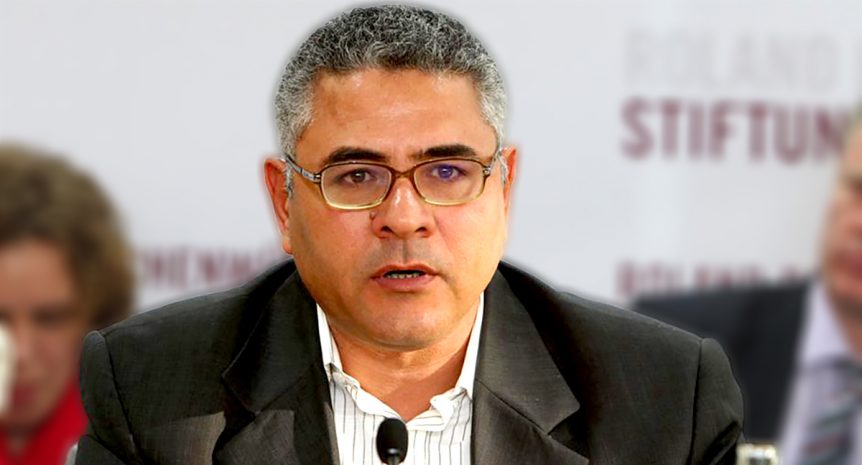
30 June, 2020
Egypt: In solidarity with Gamal Eid, rights organizations affirm reprisals will not stop human rights movement from exposing violations and authoritarian practices
This statement was first published by the Cairo Institute for Human Rights Studies
The undersigned human rights organizations condemn the escalating security and media campaign against lawyer Gamal Eid, the executive director of the Arabic Network for Human Rights Information (ANHRI). Led by Egypt’s state security forces, the sustained harassment of Eid comes as part of a wider government crackdown on Egyptian human rights defenders and organizations, which began in earnest with Abdel Fattah al-Sisi’s takeover of the presidency in 2014, and has intensified at an unprecedented rate over the last year. The undersigned fear the latest developments of the campaign against Eid are a prelude his arrest or prosecution, in retaliation for his rights’ advocacy as well as that of ANHRI.[1]
Gamal Eid, 56, is being assailed with an organized, ruthless mass media campaign through media and online platforms typically owned by businessmen with close ties to the government or the Egyptian Media Company, which is closely related to the General Intelligence Service. Media personalities – essentially acting as spokespersons for the state – warn of legal action against Eid by the Ministry of Interior, in retribution for his publication of information about prison conditions in Egypt, described as false by the ministry. Media outlets complicit in the campaign also habitually accuse Eid of politically exploiting the Coronavirus pandemic, and disseminating false information about Egypt’s human rights situation.
The vicious media smear campaign coincides with several reports filed against Gamal Eid to the Attorney General, charging him with joining the Muslim Brotherhood, classified by the Egyptian government as a terrorist group. Terrorism charges are frequently invoked by state security against citizens arbitrarily and without the backing of any evidence. These reports could be a prelude to charging Eid under one of the many politicized sham trials already underway, which would add him to the lengthy list of persons prosecuted under the same terrorism charges despite their diverse political affiliations, professions, and places of residence.
Gamal Eid has faced a concerted campaign of harassment, intimidation, and violence over the past years, which has taken many forms. In 2016, Eid’s assets were frozen and he was banned from travel, pending investigation in Case no. 173 of 2011, also known as the “Foreign Funding Case.” In 2019, Eid was physically assaulted four times in less than three months. In October alone, unknown perpetrators stole his car, and attempted to kidnap him as he was on his way home; beating him up and leaving him with fractures and bruises on his ribs. The same month, Eid was again assaulted while driving another car – the replacement for his stolen car – and the unknown assailants smashed the car windows.
On December 29th, a number of security personnel and officers stepped out of three cars, knocked him to the ground and started beating him. Then a state security officer – whom Gamal Eid recognized – gave an order to the officers to drench Eid in paint, in an attempt to humiliate him.
Gamal Eid becomes yet another of the dozens of rights defenders and staff in Egyptian NGOs arrested for their legitimate and peaceful work. Prisoners of conscience include lawyer Mohamed al-Baqer, the director of the Adalah Center for Rights and Freedoms; Amr Imam, a lawyer at the Arabic Network for Human Rights Information; Patrick George Zaki, a researcher at the Egyptian Initiative for Personal Rights; Ibrahim Ezz el-Din, a researcher on urban affairs at the Egyptian Commission for Rights and Freedoms, and Coptic activist Ramy Kamel, a founder and coordinator of the Maspero Youth Union, a Christian human rights organization. Other prominent human rights activists arrested include, among many others, Mahienour El-Masry, Esraa Abdelfattah, Alaa Abdel Fattah, and Zyad Elelaimy. Rights defenders outside of Egypt also face prosecution. Bahey eldin Hassan, director of the Cairo Institute for Human Rights Studies, was sentenced in absentia to three years in prison and a LE 20,000 fine, in reprisal for expressing his opinion on the social networking platform Twitter.
In addition to arrest and prosecution, the Egyptian government’s crackdown on the human rights movement includes a wide range of repressive practices, featuring travel bans and asset freezes, as well as relentless media defamation campaigns that go so far as to incite to murder and zealously accuse human rights defenders of treason and terrorism.
The undersigned affirm their full solidarity with Gamal Eid and all Egypt’s human rights defenders , who are facing an unparalleled onslaught by a government fixated upon eliminating the country’s human rights movement, in its entirety, through repressive, authoritarian practices contravening Egypt’s own constitution and its international human rights obligations.
The undersigned further affirm that Egypt’s human rights community and its allies will not be deterred from their defense of human rights, and the government’s ruthless quest to eliminate them only strengthens their resolve to monitor and expose violations, and protect and empower victims.
Signatory Organizations
- Cairo Institute for Human Rights Studies
- Association for Freedom of Thought and Expression
- Belady for Right and Freedoms
- Committee for Justice
- Egyptian Federation for Human Rights
- Egyptian Front for Human Rights
- Nadeem Center for Torture Victims
- The Freedom Initiative
[1] This work includes the ongoing efforts of ANHRI in supporting freedom of opinion and expression, freedom of the media, and defending victims of violations of these rights through monitoring and documentation



